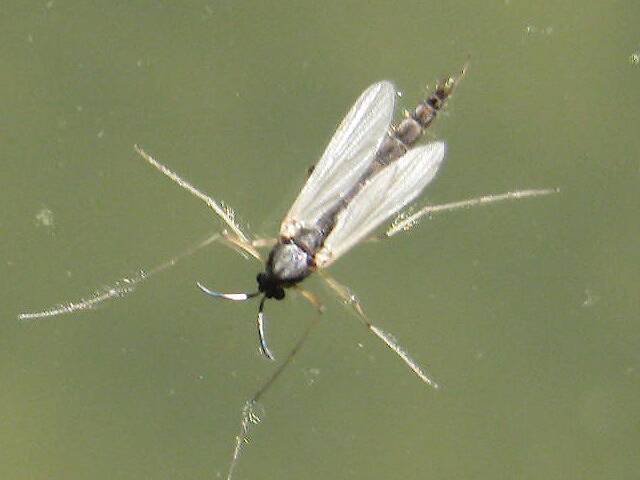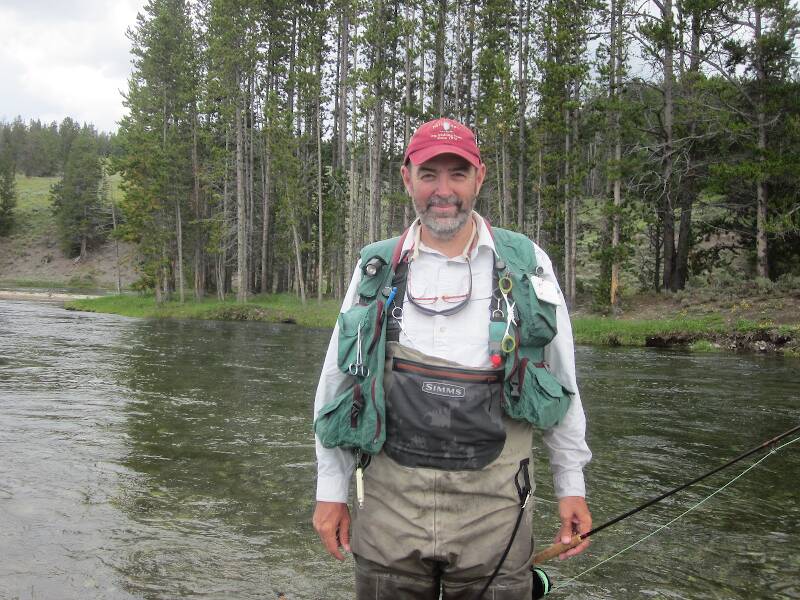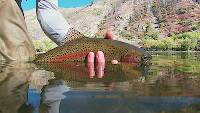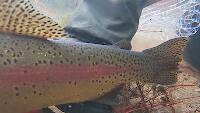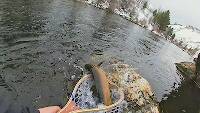
Hex Mayflies
Hexagenia limbata
The famous nocturnal Hex hatch of the Midwest (and a few other lucky locations) stirs to the surface mythically large brown trout that only touch streamers for the rest of the year.
Featured on the forum

This one seems to tentatively key to Holocentropus, although I can't make out the anal spines in Couplet 7 of the Key to Genera of Polycentropodidae Larvae nor the dark bands in Couplet 4 of the Key to Genera of Polycentropodidae Larvae, making me wonder if I went wrong somewhere in keying it out. I don't see where that could have happened, though. It might also be that it's a very immature larva and doesn't possess all the identifying characteristics in the key yet. If Holocentropus is correct, then Holocentropus flavus and Holocentropus interruptus are the two likely possibilities based on range, but I was not able to find a description of their larvae.

Troutnut is a project started in 2003 by salmonid ecologist Jason "Troutnut" Neuswanger to help anglers and
fly tyers unabashedly embrace the entomological side of the sport. Learn more about Troutnut or
support the project for an enhanced experience here.
Falsifly on Jul 31, 2010July 31st, 2010, 11:36 am EDT
I’ve been following this topic, but unfortunately it got me to thinking. On the surface, who could argue against the practice of catch and release, and the benefit it offers to the conservation of our beloved trout. And it’s only logical that we enter into discussions to further reduce mortality by suggesting improved tactics e.g. reducing the time to release, proper handling, no handling, limiting time out of the water to a minimum, not removing the fish from the water, netting technique, net material, larger tippet vs. smaller tippet, not fishing in elevated water temps, when to remove the hook and when to cut the line, the list goes on and on. I agree that all this is good as we improve the means to a desired end, but this little snippet got me questioning where we are headed.
My emphasis added.
And then I remembered this one.
http://www.troutnut.com/topic/1556
There was a time when the law abiding went out and caught their limit of trout, put them into the creel, and headed home with a meal. That is still possible today, but I’d venture to guess that it is more the exception than the rule. As the sport gained popularity and the number of fish taken increased, the powers that be realized that the resource was dwindling and stepped in to intervene. I believe it was the state of Michigan that first implemented the “No Kill Zone” here in the States (the predecessor to catch and release) and a new era was born; fishing for fun. Don’t get me wrong, fishing has always been fun, but the norm not far past was to bring some fish home. Well, the conservative mind-set jumped on this brilliant idea, and it took off. I mean, what could be better than catching all the fish you want, and all you have to do is release them. (Hey, I know it’s not that easy, but you get my drift.) Ok, so now we have an ever increasing number of C/R practitioners catching and albeit releasing an exponentially increasing number of fish. So now, what about that mortality rate?
Like I said, unfortunately it got me to thinking. So go ahead and rip into me gang.
Like you, some anglers become fly fishers partly because it facilitates releasing most or all of their catch.
My emphasis added.
And then I remembered this one.
http://www.troutnut.com/topic/1556
There was a time when the law abiding went out and caught their limit of trout, put them into the creel, and headed home with a meal. That is still possible today, but I’d venture to guess that it is more the exception than the rule. As the sport gained popularity and the number of fish taken increased, the powers that be realized that the resource was dwindling and stepped in to intervene. I believe it was the state of Michigan that first implemented the “No Kill Zone” here in the States (the predecessor to catch and release) and a new era was born; fishing for fun. Don’t get me wrong, fishing has always been fun, but the norm not far past was to bring some fish home. Well, the conservative mind-set jumped on this brilliant idea, and it took off. I mean, what could be better than catching all the fish you want, and all you have to do is release them. (Hey, I know it’s not that easy, but you get my drift.) Ok, so now we have an ever increasing number of C/R practitioners catching and albeit releasing an exponentially increasing number of fish. So now, what about that mortality rate?
Like I said, unfortunately it got me to thinking. So go ahead and rip into me gang.
Falsifly
When asked what I just caught that monster on I showed him. He put on his magnifiers and said, "I can't believe they can see that."
When asked what I just caught that monster on I showed him. He put on his magnifiers and said, "I can't believe they can see that."
GONZO on Aug 1, 2010August 1st, 2010, 8:33 am EDT
Hi Allan. While you're in the (thinking) mood, here are a few more random thoughts to consider:
As a general long-term trend, overall participation in recreational freshwater angling seems to be declining. One source (Responsive Management) claims that "Freshwater fishing participation has been declining over the past 15 years from 31 million participants in 1991 to approximately 25 million in 2006."
Whatever catch-and-release-related mortality figures you choose to accept, it's quite possible that some increase in overall mortality would result from an increase in catch-and-release angling pressure. However, if you believe (as I do) that individual catch rates might decline somewhat with an increase in pressure, that could be an offsetting factor.
Although the high catch-and-release numbers reflected in topic 1556 might seem alarming to some, they are not representative events. Consider this anecdotal example of one experienced and (somewhat) successful "catch-and-release" fly fisher:
This angler fished for trout an average of about 35-40 days a year and angling "success" ranged from 0-95 trout caught per day. Despite the extreme range of high and low, the angler's average catch per day remained fairly stable when considered on a season-long basis, varying from about 8.4 to 9.6 trout per day. (One season with an extremely low number of angling days and a catch rate boosted by a Alaskan vacation is excluded from consideration. That season produced an atypical average of 24.6 trout-per-day--a happy anomaly.)
The probability of this angler being able to catch and kill a limit would seem to be high on any given day. Are you suggesting that the angler's impact on the trout population would be lessened by killing a limit and going home each time?
Actually, you may be onto something there. I believe that this particular angler would tire of consuming trout in a very short time. Come to think of it, that may explain why many animal rights/liberation groups are supporting the elimination of catch-and-release (voluntary or regulated) in favor of catch-and-kill regulations. On its face, this does not seem to be in keeping with their avowed principles, which advocate the elimination of all angling. Perhaps they realize that requiring anglers to eat everything they catch would drive some of them (Spence, for example) from the sport entirely. Or perhaps they are counting on the long-term effects of mercury poisioning. :)
All joking aside, for those who are interested in reading a very sensible and cogent take on the whole ethical-catch-and-release-do-fish-feel-pain hullabaloo, I highly recommend the following paper:
http://www.igb-berlin.de/abt4/mitarbeiter/arlinghaus/download/ArlinghausEtal_FishFish_2007.pdf
As a general long-term trend, overall participation in recreational freshwater angling seems to be declining. One source (Responsive Management) claims that "Freshwater fishing participation has been declining over the past 15 years from 31 million participants in 1991 to approximately 25 million in 2006."
Whatever catch-and-release-related mortality figures you choose to accept, it's quite possible that some increase in overall mortality would result from an increase in catch-and-release angling pressure. However, if you believe (as I do) that individual catch rates might decline somewhat with an increase in pressure, that could be an offsetting factor.
Although the high catch-and-release numbers reflected in topic 1556 might seem alarming to some, they are not representative events. Consider this anecdotal example of one experienced and (somewhat) successful "catch-and-release" fly fisher:
This angler fished for trout an average of about 35-40 days a year and angling "success" ranged from 0-95 trout caught per day. Despite the extreme range of high and low, the angler's average catch per day remained fairly stable when considered on a season-long basis, varying from about 8.4 to 9.6 trout per day. (One season with an extremely low number of angling days and a catch rate boosted by a Alaskan vacation is excluded from consideration. That season produced an atypical average of 24.6 trout-per-day--a happy anomaly.)
The probability of this angler being able to catch and kill a limit would seem to be high on any given day. Are you suggesting that the angler's impact on the trout population would be lessened by killing a limit and going home each time?
Actually, you may be onto something there. I believe that this particular angler would tire of consuming trout in a very short time. Come to think of it, that may explain why many animal rights/liberation groups are supporting the elimination of catch-and-release (voluntary or regulated) in favor of catch-and-kill regulations. On its face, this does not seem to be in keeping with their avowed principles, which advocate the elimination of all angling. Perhaps they realize that requiring anglers to eat everything they catch would drive some of them (Spence, for example) from the sport entirely. Or perhaps they are counting on the long-term effects of mercury poisioning. :)
All joking aside, for those who are interested in reading a very sensible and cogent take on the whole ethical-catch-and-release-do-fish-feel-pain hullabaloo, I highly recommend the following paper:
http://www.igb-berlin.de/abt4/mitarbeiter/arlinghaus/download/ArlinghausEtal_FishFish_2007.pdf
Oldredbarn on Aug 2, 2010August 2nd, 2010, 3:22 am EDT
Like I said, unfortunately it got me to thinking. So go ahead and rip into me gang.
Allan,
We aren't going to "rip" in to you...This is what science is all about the "dialectic" man!...and why we love this site! We need to be thoughtful while we are at it whether or not we always agree with each other...Maybe this is why Jason labeled this "Forum" and not "ranting blog site".
As long as we are "thoughtful" we are more likely to try and do the "right" things...For the fish & for the environment (I hate the phrase "for the resource"...I don't fish in a resource I fish in a stream), and for our comrades that just love having all of "it" availabe to them.
Great stuff guys! I never know here what will transpire when I put the stick in the you-know-what and give it a stir...99% of the time I expect a stinky smell but get a wonderful discussion instead!
Vielen Dank!!!
Spence
"Even when my best efforts fail it's a satisfying challenge, and that, after all, is the essence of fly fishing." -Chauncy Lively
"Envy not the man who lives beside the river, but the man the river flows through." Joseph T Heywood
"Envy not the man who lives beside the river, but the man the river flows through." Joseph T Heywood
Quick Reply
Related Discussions
Topic
Replies
Last Reply
Re: Fish that have been caught before may be more likely to be caught again
In General Discussion by Troutnut
In General Discussion by Troutnut
9
Sep 15, 2010
by GONZO
by GONZO
4
Jul 25, 2019
by Iasgair
by Iasgair


